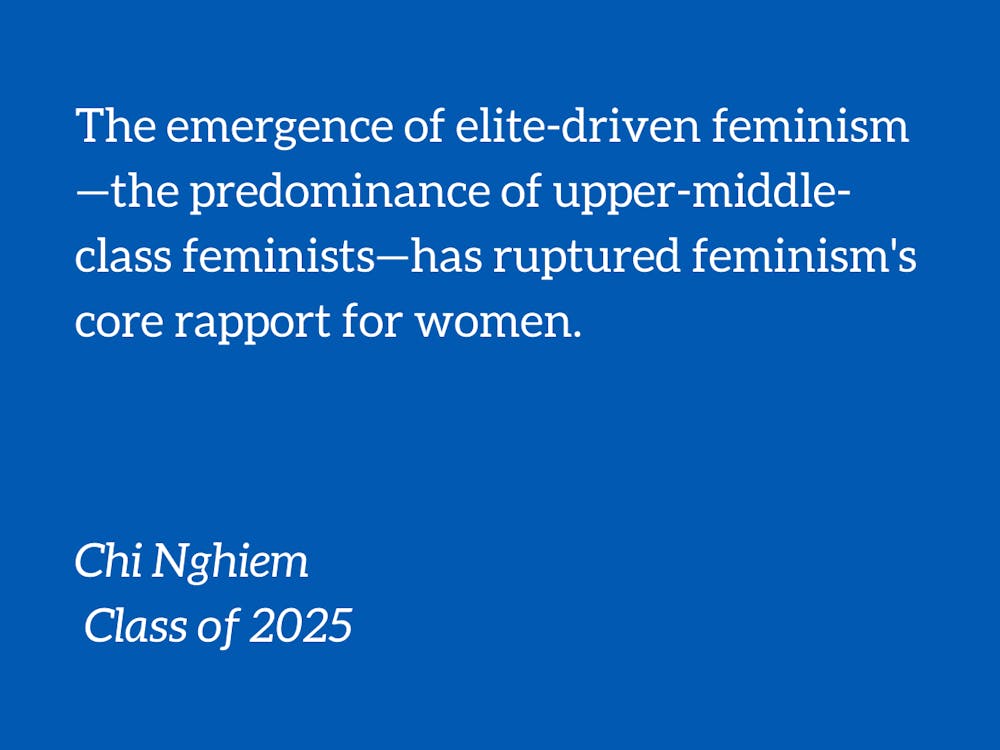“In a picturesque scenery of the aurora, Phung, a photographer, immersed himself in every aesthetic shot he took of a boat on the resplendent surface. A moment later, an appalling event disrupted. An enraged man and a sleep-deprived woman left their boat, walked to a storage of old war tanks, and stopped. The man pulled out a thick belt, thwacked relentlessly with rancor, and berated her, ‘You all go die. Go to hell!’ Verbally and physically brutalized by her husband, the no-name woman stood still, voiceless, and submissive.”
This is an excerpt from the renowned novel “Chiếc Thuyền Ngoài Xa (An Offshore Boat),” often taught in Vietnamese high school seniors’ Philology course. Writing amid the epoch of Vietnam’s Đổi Mới economic reforms, the novelist Nguyen Minh Chau wished to depict the toilsome lives of laborers, insinuating the rampancy of remnants from past patriarchy and feudalism.
A few days later, Phung encountered the woman in his friend Dau’s court office. Dau was demanding her to get a divorce citing household violence. Undeterred by her resistance, Phung joined Dau and persisted in attempting to rescue her from her husband’s ferocity.
“Thank you all,” the woman said, “but you guys are not hawkers. You don’t understand the hardship of working people.” She continued by recounting her past: “From a young age I was a pockmarked, ugly girl. Only my husband wanted to marry me. At that time, he was gentle, never beating me.” And she blamed herself: “If only I had fewer children or we could have bought a larger boat. The main fault is that women bear too many. Offshore women have to live for their children. Don't make me leave him!”
I was astonished by the novel’s resonance. After nearly half a century, through the ascendancy of feminism, elimination of sexist bigotry and dignification of identity on social media, the story still consternates me not only with anguish from the repugnance towards women but also its ingrained internalization. Despite increased enfranchisement, individual liberation from reproductive duties and steps being taken towards the abolition of the wage gap, the status quo of the underprivileged woman has stagnated.
Dau and Phung, intrepid and compassionate, represent the erudition, devotion and justice-oriented spirit of contemporary zeitgeist. They, similar to gender-equality advocates nowadays, omit the link between socioeconomic status, educational level and the ability to escape from the entrenchment of subordination. At first, the nameless woman seemed identical to any victim of male chauvinism in need of feminist heroism. But it was not that simple; she was constrained by the tenacity of society’s expectations for women, which—supplemented by economic incapacity—precluded her from being a benefactor of feminism.
The emergence of elite-driven feminism—the predominance of upper-middle-class feminists—has ruptured feminism's core rapport for women. Feminism has changed the role of women in society: they theoretically have the freedom to choose, to do and to be anyone. However, that is all feminism can do; it can not rescue the poverty-stricken women of the world. In a meritocratic society, those who are competent dominate the social hierarchy. Behind their achievements is often the inherent existence of the aristocracy, the wealth of their oligarchical parents or the prerogative exclusive for the upper-class. In parallel, elite-driven feminism aligns feminism with success, resilience and audacity.
Those who perpetuate elite-driven feminism and the managerial class share reciprocity: the former used the latter to boost their power and influence, the latter capitalized on the former’s image to boast about pseudo diversity. Repetition of slogans mixing feminism ideology with meritocracy reinforces our faith in a can-do world for every Miss and Mrs. When we look closely into the real benefactors of policies claiming to regard women’s rights, empowerment is futile to lower-class women.
Alison Wolf, author of “The XX Factor,” commented in her article on the segregationist interests of childcare subsidies that only young, educated, middle-class mothers who have stable careers and work regular hours send their children to these services. On the contrary, women involved in part-time employment need flexibility due to constant work schedule instability; daycare centers are not a viable option.
Society’s affinity for assertive, successful and independent women who constantly challenge toxic gender stereotypes leads to privileged feminists ascribing their failures to misogynistic, domineering and ignorant individuals. For example, Hillary Clinton’s 2016 campaign slogan #I’mWithHer morphed U.S. political competition into a gender war. However, while thought-evoking, that pro-women hashtag axiomatically contradicts her otherwise bourgeois philosophy of feminism, supported by Trump defeating Clinton among working-class white women. Instead of empowering underprivileged women and men, feminist “icons” implicitly denigrate them with hubris.
The unnamed woman in “Chiếc Thuyền Ngoài Xa” epitomizes the destitute, downtrodden and uneducated majority of women. Different from the predicaments cultured patricians often face, baseborn women confront a multiplicity of plights from both society and their assumedly superior companions. There are fearless people trying to save them like Dau and Phung, but their simplistic solutions are distorted by the promises of ill-suited policies from the upper class.
To conclude: We should stop idolizing the illusionary glory of modern elite “feminism” and start embracing ourselves and the people around us. Go home, thank your mom, and hug her tightly. It is time feminist activists begin to fight for all women, at all levels of society.
Chi Nghiem is a Duke Kunshan University first-year. Her column runs on alternate Fridays.
Get The Chronicle straight to your inbox
Signup for our weekly newsletter. Cancel at any time.

